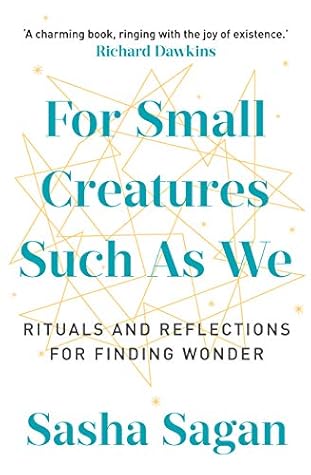More on this book
Community
Kindle Notes & Highlights
by
Sasha Sagan
Read between
September 5 - September 11, 2021
They taught me that science wasn’t just a set of facts to be compared and contrasted with other philosophies but a way of testing ideas to see which ones stand up to scrutiny. They taught me that what scientists think today might be disproven tomorrow, and that’s wonderful, because that’s the pathway to a better, deeper understanding.
Being alive was presented to me as profoundly beautiful and staggeringly unlikely, a sacred miracle of random chance.
“for small creatures such as we, the vastness is bearable only through love.”
In every inhabited corner of the Earth, human beings have created rituals to give order and meaning to existence.
We all deserve holidays, celebrations, and traditions. We all need to mark time. We all need community. We all need to bid hello and goodbye to our loved ones. I do not believe that my lack of faith makes me immune to the desire to be part of the rhythm of life on this planet.
“The only sin would be to pretend.”
Beneath the specifics of all our beliefs, sacred texts, origin stories, and dogmas, we humans have been celebrating the same two things since the dawn of time: astronomy and biology.
Religion, at its best, facilitates empathy, gratitude, and awe. Science, at its best, reveals true grandeur beyond our wildest dreams.
Rituals are, among other things, tools that help us process change. There is so much change in this universe. So many entrances and exits, and ways to mark them, each one astonishing in its own way. Even if we don’t see birth or life as a miracle in the theological sense, it’s still breathtakingly worthy of celebration.
“I don’t believe” in something doesn’t mean that I am certain it doesn’t exist. Just that I have seen no proof that it does, so I am withholding belief.
“Absence of evidence is not evidence of absence.” We don’t have proof, so we don’t know.
Time is an elusive concept. It’s passing constantly, yet it’s so hard to feel. It’s like lying in the grass, trying to feel the Earth rotate. When changes are both small and constant, we can’t grasp them.
but the biggest gift was the idea that celebrations could be invented, that we could choose to honor what was most meaningful to us, that and the knowledge that spring was finally here.
The pre-Socratic sophist philosopher Protagoras of Abdera wrote this: “Concerning the gods, I have no way of knowing either that they exist or that they do not exist, or what they are like in form. There are many things that impede that knowledge, both the obscurity (of the subject) and the brevity of human life.”
“Science demands a tolerance for ambiguity. Where we are ignorant, we withhold belief. Whatever annoyance the uncertainty engenders serves a higher purpose. It drives us to accumulate better data.”
But that’s the thing about death—it makes you appreciate life. It’s almost impossible to appreciate something without facing its absence. Just as we cannot improve ourselves if we cannot acknowledge where we’ve floundered, and atone.
And that if life went on forever it would not be as precious. I started reminding myself that even though I will certainly die someday, I am alive right now, which is an incredibly lucky thing. Slowly, this idea started to bring me a kind of giddy joy, almost like butterflies in my stomach.
There is something about facing fear that defines growing up. Doing something hard, freeing yourself, taking your fate into your own hands—these are the portals into adulthood across the planet.
That feeling of sunshine is a true mood enhancer. The ultraviolet radiation we get from the sun releases endorphins in our brains. It’s a real chemical reaction, a scientific connection between our bodies and our closest star. How beautiful is that? How astonishing that being bathed in rays of light from a 4.6-billion-year-old mass of hydrogen and helium located 93 million miles away can make us feel happy?
Writing is perhaps the greatest of human inventions, binding together people who never knew each other, citizens of distant epochs. Books break the shackles of time. A book is proof that humans are capable of working magic.
Questioning something, exploring it, examining it, thinking of ways it might change for the better is a way of loving something.
That’s what a birthday is: the realization that time is passing but we are still alive.
In 1996 the first scientific paper was published that showed that women not only pass on their genes to their babies but that their babies leave cells behind that become part of the mother. It’s called microchimerism.
In this plate of food, I see clearly the presence of the entire universe supporting my existence.


